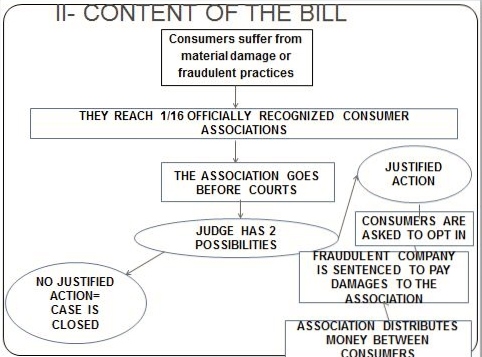Introduction
On the 13th of September 2013, the Senate adopted a bill on consumption which will bring some changes in consumption law.
The bill’s main provision that the French government is set to consider American-style “class-action” lawsuits and would be a first for France.
Collective lawsuits originated in the United States and are still predominantly a U.S. phenomenon. But, in several European countries with civil law, changes have been made in recent years to allow consumer organizations to bring claims on behalf of consumers.
Until this new bill, consumers could only be protected by suing individually or thanks to consumers associations. However, these latters only have a limited right to bring an action against fraudulent companies (because they can only join their action to one already existing) that’s why the creation of a class-action system was raised some years ago.
What is a class-action lawsuit ?
A class-action lawsuit enables groups of individuals to collectively sue a defendant or group of defendants, without separately having to file a case and hire a lawyer. Some of the victims will be able to sue on behalf of others.
There are 2 ways for consumers to be part of a class action: opt in and opt out systems:
>The « Opt-in » way which will be used in France consists for the consumer to expressly give her/his consent to be part of the class action.
>Whereas the “Opt out” concept is the one used by the American class-action system= the principle here, is that all the potential victims are part of the class-action and can exclude themselves from the claim if they do not want to be part of the class-action.
FRAMEWORK OF THE NEW BILL
The concept in France will be the following:
Consumers who have suffered from material damage or fraudulent practices by a company will now have the opportunity to reach one of the 16 officially recognized consumer associations to relate the damages they have suffered. Then, the submitted association are entitled to apply before courts.
The judge has 2 possibilities:
-either the judge considers that no action can be brought, then the case is closed
-or, the judge considers that there is a justified action. In this situation, the association asks the consumers to ‘opt in’ as I was explaining at the beginning, and the company is sentenced to pay damages to the association. The final step is for the association to distribute the amount of damages between the consumers who ‘opted in’.
The reform is designed to give consumers “effective weapons against fraudulent companies,” the main ideas of the bill regarding the class-actions are:
>The legislation will offer a more limited version of class action litigation than is found in the United States.
>Firstly, under the proposals collective lawsuits will have to be brought through one of France’s 16 officially recognized consumer associations such as UFC-Que-Choisir, Afoc or CGL.
>Secondly, compensation would only be able to be sought for material damages arising from a company’s legal or contractual violation. (for example, it can be a defective piece in a dishwasher or an unfair clause in a contract.
>Furthermore, whereas in the United States, class action suits are often pursued over public health scandals (such as the asbestos disease case), under this plan collective litigation would be limited to grievances over competition and consumer breaches.
However, there would be no minimum number of plaintiffs required to bring a case, and perhaps most significantly, no upper limit to financial damages.
